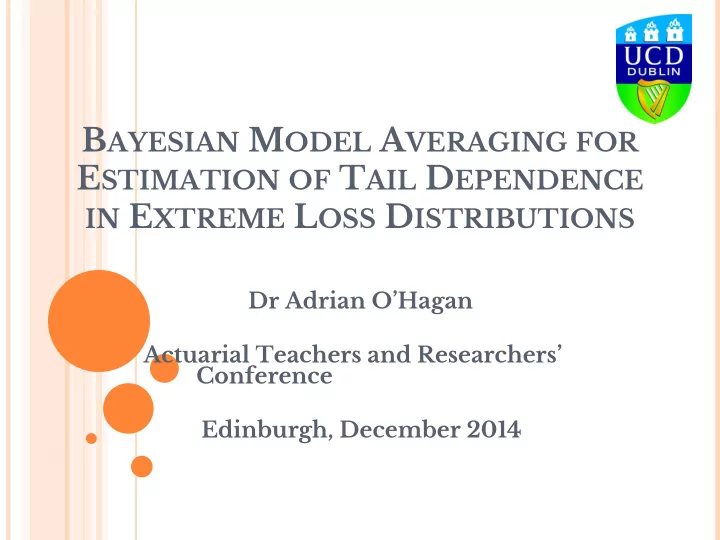

B AYESIAN M ODEL A VERAGING FOR E STIMATION OF T AIL D EPENDENCE IN E XTREME L OSS D ISTRIBUTIONS Dr Adrian O’Hagan Actuarial Teachers and Researchers’ Conference Edinburgh, December 2014
INTRODUCTION ➢ OBJECTIVE o Assess tail dependency between “random variables” ➢ APPROACH o Copulas o Upper tail dependence coefficient o Bayesian model averaging ➢ RESULTS o Simulated loss data
COPULA FUNCTIONS Risk 1 Risk 2 . Copula Multivariate . Function Distribution . Risk N
SKLAR’S THEOREM •
SELECTED COPULAS ➢ The t copula ➢ Natural successor to the Gaussian copula (?) ➢ Incorporates symmetric upper and lower tail dependence. ➢ The Gumbel and Joe Copulas ➢ Incorporate upper tail dependence. ➢ Both have lower tail dependence coefficient of 0. All available through the copula package in R.
UPPER TAIL DEPENDENCE COEFFICIENT •
APPROACH ➢ 1) Simulate loss data. ➢ 2) Fit chosen copulas to the data. ➢ 3) Calculate the upper tail dependence coefficient estimate for the data from each copula. ➢ 4) Weight across the upper tail dependence coefficient estimates.
WEIGHTING ACROSS COPULAS •
WEIGHTING ACROSS COPULAS •
SIMULATED DATA •
TRUE VALUE OF UPPER TAIL DEPENDENCE COEFFICIENT FOR T COPULA •
SIMULATED DATA • BIC Copula Upper Tail Dependence Coefficient t 0.238 -1,205.35 Gumbel 0.471 -146.74 Joe 0.620 -157.58 BIC Copula Upper Tail Dependence Coefficient t 0.781 -1,439.96 Gumbel 0.764 -1,435.68 Joe 0.759 -1431.34
RESULTS: BIVARIATE T DATA •
RESULTS: BIVARIATE GAMMA AND BETA DATA •
CONCLUSIONS • Bayesian model-averaging provides a computationally straightforward, statistically robust way to: • 1) Identify when a copula model for tail dependence is significantly better than other candidates. OR • 2) Blend information from multiple copula models for tail dependence when more than one model is “good”.
FURTHER WORK • R package BMAcopula (for absorption into the copula package) • Research paper (paired with empirical copula tail dependence coefficient estimation)
REFERENCES ➢ “ Measurement and modelling of dependencies in economic capital, a discussion paper ”. Shaw, Smith & Spivak, May 2010. ➢ “ The t copula and related copulas ”. Demarta & McNeil, May 2004. ➢ “ Bayesian model averaging in R ”. Amini & Parmeter. ➢ “ Modelling the dependence structure of financial assets: a survey of four copulas ”. Aas, Dec 2004.
Recommend
More recommend